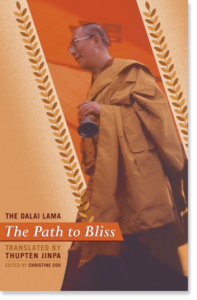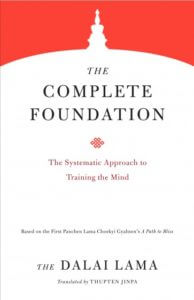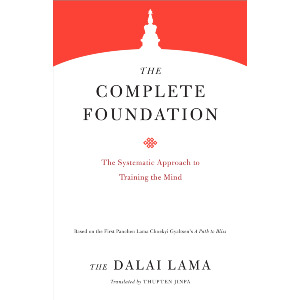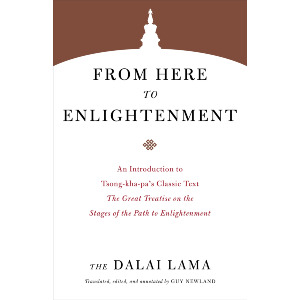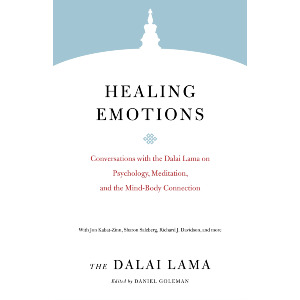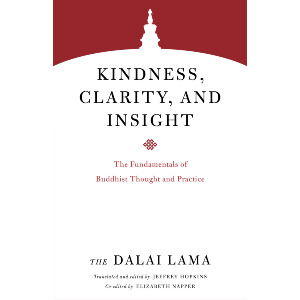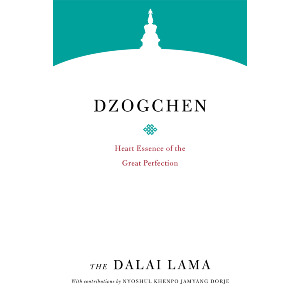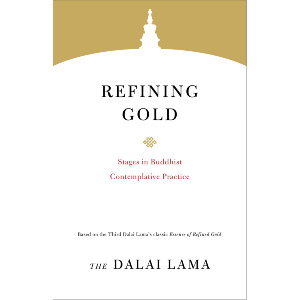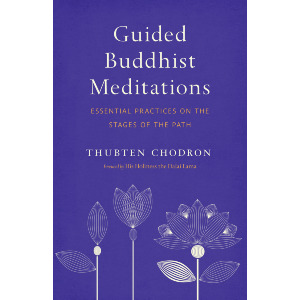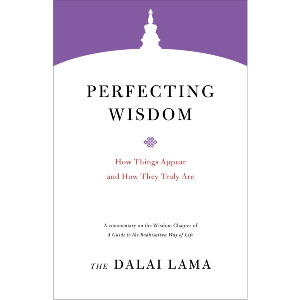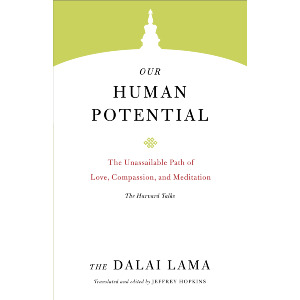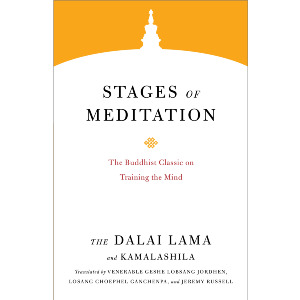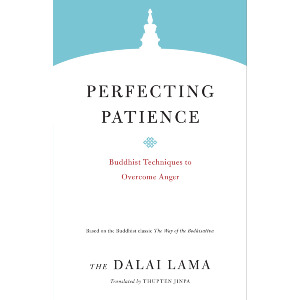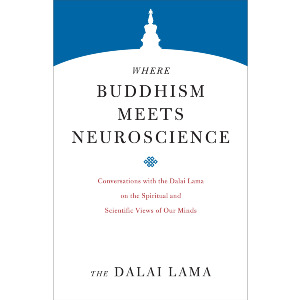| The following article is from the Spring, 1991 issue of the Snow Lion Newsletter and is for historical reference only. You can see this in context of the original newsletter here. |
The following excerpt is an extract from the chapter on Death and Impermanence
The Path to Bliss, now published under the titles The Complete Foundation
A Practical Guide to Stages of Meditation
 You should develop the conviction that awareness of death and impermanence is an important element of the Buddha's teaching, and that this is why the Buddha taught impermanence at the beginning of all his teachings when he first taught the Four Noble Truths.
You should develop the conviction that awareness of death and impermanence is an important element of the Buddha's teaching, and that this is why the Buddha taught impermanence at the beginning of all his teachings when he first taught the Four Noble Truths.
The first phase of the practice is to restrain the negative actions that could propel you to lower realms of existence. The cause of your body is contaminated actions and delusions, and as long as you are under their influence there is no place for happiness. In a similar way there is no possibility of happiness and peace while someone is under the leadership of a very negative person. Therefore, reflect upon the fact that you are under the rule of ignorance; ignorance is like the despotic king, and anger and attachment are like his ministers. We live under the tyranny and influence of ignorance, the self-grasping attitude, and also the self-cherishing attitudefactors that all the buddhas and bodhisattvas treat as real enemies. The worst thing is to be under the influence and grip of these negative factors.
The second phase is to engage in the method of rooting out the delusions that are the root of these negative actions. This is done by applying their opponent force, the wisdom realizing emptiness, which eliminates the grasping at self-existence. Eliminating these delusions, together with their root, marks the achievement of liberation.
The third phase is to eliminate the dispositions or imprints left by the delusions that obstruct you from achieving omniscience, the direct knowledge of all phenomena. This should be done by complementing the wisdom realizing emptiness with the factors of methodcompassion, bodhicitta, patience, generosity and so forth. If you are able to cultivate a powerful mind that focuses on the welfare of infinite numbers of sentient beings, you will develop a courage that is able to endure infinite hardships for their benefit. Because of the great power of this practice, you will be able to accumulate great stores of merit. When you accumulate these stores of merit by complementing the wisdom of emptiness with the powerful factor of method, you will be able to free yourself totally from all wrong views and misconceptions.
Even in ordinary terms, you would need to have a certain fear of impending danger in order to seek a refuge. Similarly, in order to have a firm practice of refuge, it is first very important to recognize the danger that you are facing. Doing this depends upon a recognition of the unsatisfactory and pain-producing nature of life in this cyclic existence. When you have clearly recognized the frustrating nature of life in this cycle of existence in general, and the sufferings in the lower realms in particular, a genuine desire to seek refuge will follow. To achieve such a recognition, some reflection on impermanence and death is essential. Therefore, when the Buddha taught the Four Noble Truths, he first spoke of impermanence.
The lack of death awareness prevents one from undertaking the practice of dharma. This is very true: If one is not aware of the eventuality of death, one will be totally concerned and preoccupied with the affairs of this lifetime alone, and with actions that are just for the benefit of this lifetime. Such ventures may take all one's time and energy, but no matter how important they appear to be, since they are directly related to this lifetime alone, their benefits are limitedonce one leaves the present body, their benefit ends. Even though one might have a best friend, when one has to leave the body, one cannot take the friend along.
So many people have been born in this world in the past, but all of them are now just memories. Just as the texts say, great buddhas and bodhisattvas of the past, although great beings, also are only memories. The same is true of great kings and so forth. Reflect upon the fact that even the Buddha himself has passed into nirvana. The same will happen to us. Think of how things will look after one hundred years: none of the people assembled now inside this temple will be alive. Even this building may not remain. To prove this, it is not necessary to quote from scriptures nor to give any logical reasons. Even since last year's teachings, I can see that some of my friends have passed away. The same will happen to those who have gathered here this yearnext year when we gather for the teachings it is definite that some of us will be no morebut none of us will even have the thought, It will be me," because of our strong habituation to the apprehension of permanence.
Think that after twenty or thirty years even the Dalai Lama, who has been talking so much, will also be no more. While I am alive, there will be people who are, from the depths of their hearts, prepared to give their lives for my sake, but on the day when I have to leave, I cannot take even one among them with me. Neither will I be able to take any of my possessions, even the body which has been with me since the time of my birth and which I have always preserved and protected. This also will be left behind. At that time of my death, what will benefit is only the positive seeds that are imprinted upon my consciousness. No other factors will help at that time. This is very true, a fact that can be proved and observed.
Therefore, if you are totally concerned and preoccupied with the affairs of this lifetime, there is a great danger of causing your own downfall. If by such concern you were able to achieve the desired happiness, that is okay, but this is not the case. We all let ourselves be caught in this web of preoccupation with the activities and confusion of this lifetime. Having too much worldly involvement ends in confusion. We spend our whole lives thinking that this might be better than that, I should do this, or perhaps something else is better and I should do that. If you reflect upon the underlying dissatisfaction, then you will be able to find that, well, after all, whatever they might be, the affairs of this lifetime are not that important, because they yield a limited benefit. This does not mean that you should not work for your own livelihood, but it does indicate that you should not be preoccupied with that alone.
Your meditation on death and impermanence should be inspired by great delight. You should see this meditation as a factor that will really encourage you to engage in dharma practice.
If you have the awareness of death you stand to gain a lot. It is important not only at the initial stage, but also during the actual path. When you possess such awareness and mindfulness, although you may work for your own livelihood, you will not take that as the most important thing. If a person has prepared for death from a long time back, when death comes it will not come as a shock because he will be well prepared; he will feel that death is merely like changing his clothes. Whereas if a person just avoids the question of death, trying to forget about it, then when death comes, he might be caught totally unprepared and be bewildered by it.
But if you are mindful of death and have this death awareness, you will always think of the future and make preparations for it, and when death strikes it will not come as a surprise, so you will not be so anxious. Consequently, at that point you will be able to maintain your calmness of mind.
Just requesting prayers from others at the time of death and not doing anything yourself is very improper and contradicts any claim that you are a follower of dharma. Sometimes I actually say this when people come to seek my prayers for them. I know an old Tibetan lady who always used to ask me, Oh, Your Holiness, do not let me fall in the hell realms"as though I have that in my hand! There is nothing I can do if she has done nothing on her part. Not only I, but even the Buddha does not have the power to save such a being. Therefore, the Buddha taught the infallibility of karmic law. If the great beings like the Buddha have the power to determine the fate of the living beings, then there is no need for him to talk about the infallibility of karmic law. If you are equipped with this death awareness, you will always work to accumulate virtuous actions to prepare for your future.
[This section is followed by a meditation on death.]
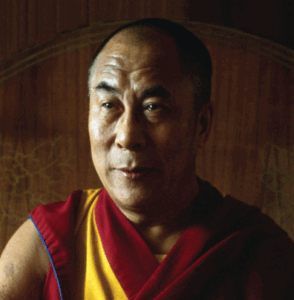
His Holiness the Fourteenth Dalai Lama is considered the foremost Buddhist leader of our time. The exiled spiritual head of the Tibetan people, he is a Nobel Peace Laureate, a Congressional Gold Medal recipient, and a remarkable teacher and scholar who has authored over one hundred books.
$22.95 - Paperback


